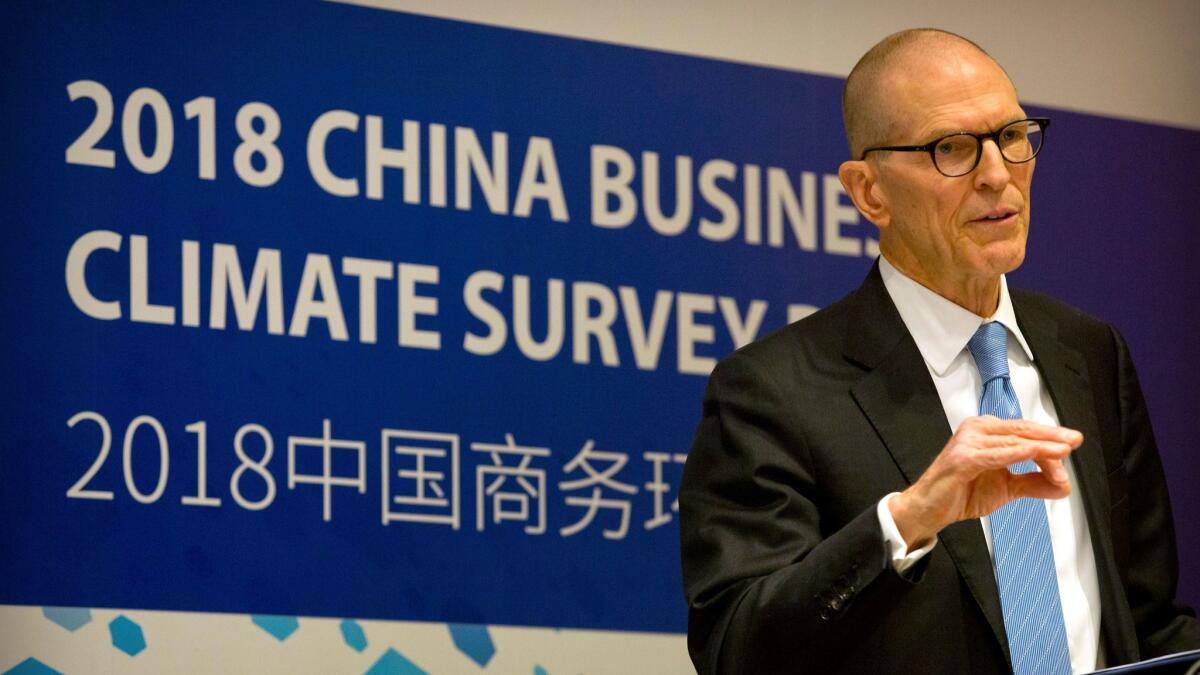China will act if Trump hits out on trade, American business group warns

- Share via
Reporting from Beijing — Chinese officials plan to take aim at U.S. companies if President Trump inflicts tariffs, a key American business lobby warned Tuesday, potentially veering both countries toward a trade war that could cripple global markets.
The Trump administration this month fired what many saw as the opening salvo in a simmering dispute over trade. The U.S. imposed tariffs on imports of solar panels and washing machines, which largely targeted China. U.S officials are currently investigating whether Beijing is stealing American business’ intellectual property or dumping steel in the U.S. market.
“I’ve been told by certain officials that, yes, definitely, there will be retaliation” if Trump takes additional action, said William Zarit, chairman of the American Chamber of Commerce in China, during a briefing to discuss the results of an annual business climate survey.
Officials did not specify how they would respond or what would instigate it, Zarit said.
Beijing already has imposed tougher requirements on American soybeans, a top export to China grown in many of the states Trump won. Chinese authorities could go after additional agriculture or aircraft, another major export.
“From a Chinese perspective, they’d likely target sectors that have political resonance in the U.S.,” said Lester Ross, the chamber’s policy committee chairman. He singled out Boeing, which competes with Europe’s Airbus for sales to Chinese carriers. The U.S. company gets nearly 11% of its revenue from China and projects demand over the next two decades will reach nearly $1.1 trillion.
China also could launch anti-dumping investigations of its own on American imports, Ross said, on grounds that they are sold below market value or are subsidized by the U.S.
Washington won’t announce the results of its intellectual property investigation until after Trump’s first State of the Union on Tuesday, Ross said.
This could reshape the publicly affable relationship between Trump and President Xi Jinping, who flattered Trump with a Peking Opera performance and tour of the Forbidden City in a “state visit-plus” last November. Trump stood next to Xi near the end of his trip and blamed previous U.S. administrations, not China, for a widening trade imbalance.
China’s Commerce Ministry has vowed to “resolutely defend” its interests if Trump seeks significant trade remedies. The state-run Global Times, in a recent editorial, warned U.S. leaders should realize China is not “a tamed sheep.”
American firms still voiced confidence in the survey that China will further open to foreign investment, despite deep anxieties about unfair treatment and increased protectionism.
“There is hope,” said Zarit, who quickly cautioned against too much of it. “At this point, it’s difficult to see how we can address those imbalances elegantly or smoothly.”
Some 46% of the 411 companies surveyed believe the government would welcome more foreign investment in the next three years, up from 34% in 2016. More than half of the respondents, from the largest U.S. banks to small refrigeration companies, think their industry will grow this year.
Even so, three-quarters of the companies surveyed said they felt increasingly unwelcome, due largely to market restrictions and uneven enforcement of laws. China’s nearly 1.4 billion people present a tempting opportunity to major American companies, so much that they sometimes put up with a lack of transparency and less access than domestic competitors.
“To have a very good understanding of what is happening in China is increasingly a challenge,” an unnamed company executive said, according to the survey. “If you ask 1,000 people, you get 1,000 different interpretations.”
The chamber warned that numerous companies were not included because Chinese government restrictions keep them from entering the market. It also noted that the survey took place during October and November, around the time President Trump visited China and took no major actions on trade.
Under Xi, politics and the Communist Party are creeping further into boardrooms. Analysts say party cells embedded inside companies — often the price of doing business — are starting to take a more active role. Some businesses also worry the government is restricting their use of virtual private networks, which allow organizations to sidestep the Great Firewall and access uncensored information.
China’s technology minister, Miao Wei, on Tuesday insisted the country is not hobbling outside companies. “As China’s achievements are closely connected to its opening up, we will, as always, widen market access for foreign investment and the door will never be closed,” he said, according to the New China News Agency.
American companies may scoff at that remark, but they don’t appear to see a drawn-out battle over trade as the solution. Some 78% of respondents believe positive relations between the two nations are very or extremely important, up from 64% in 2015.
“We certainly don’t think a trade war would be helpful to our businesses at this point,” Zarit said. And yet, he added, negotiations haven’t fared so well either.
“There’s a sense that strictly just dialogue has not really brought much in terms of progress,” he said. “So perhaps some pressure will help.”
Meyers is a special correspondent.
Twitter: @jessicameyers
ALSO
Trump slaps big tariffs on imported solar panels in major escalation of a trade fight with China
China cautions U.S. against starting a trade war, casting itself as champion of globalization
China wants to build an innovation capital by fiat. Can it?
More to Read
Sign up for Essential California
The most important California stories and recommendations in your inbox every morning.
You may occasionally receive promotional content from the Los Angeles Times.












